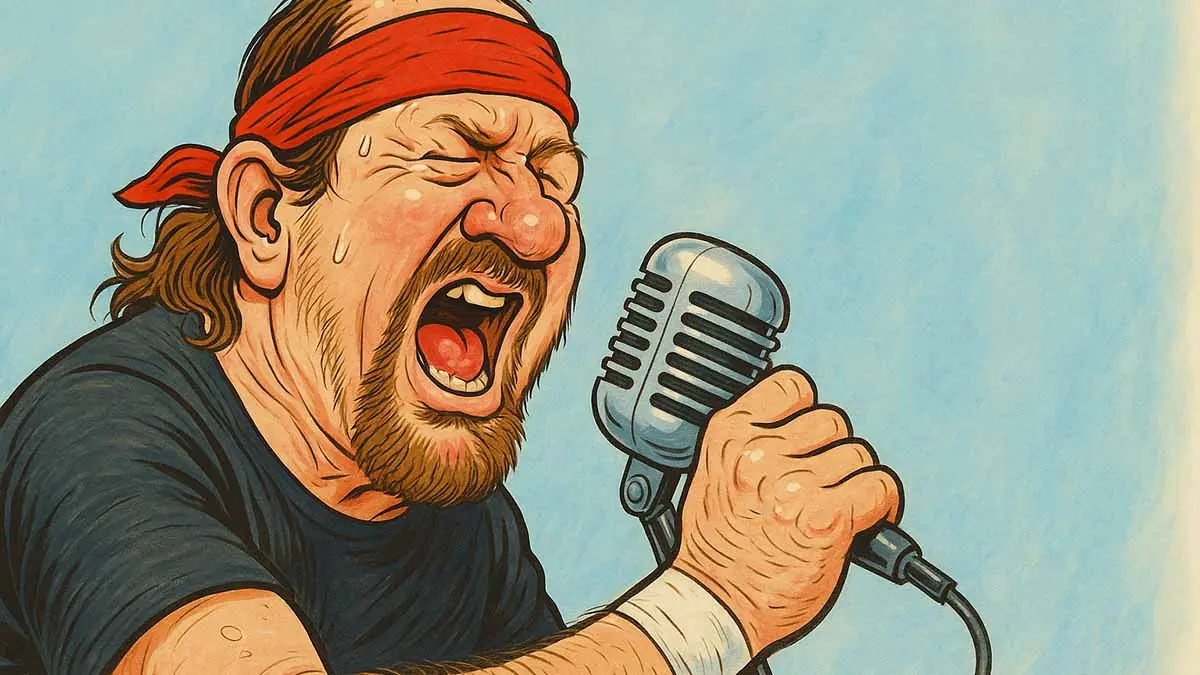Cornette between the covers
When word got out that Jim Cornette was writing a book, the most common observation was that he didn’t need an editor; he needed a censor. If blue language and expressive outbursts were tickets to a wrestling match, Cornette would be front row center every week.

To be sure, there is some of that in The Midnight Express and Jim Cornette 25th Anniversary Scrapbook. Witness this sampler from the less profane side: “Your fat old bodies and ugly-ass selves have no place in this world.” “Your mouth runs like a clapper in a goose’s ass.” “You make me sick.”
The hitch is that those snide remarks are not from the wrestling manager known as the “Louisville Lip.” They’re from fans that berated or threatened Cornette and the Midnight Express for employing underhanded ways during their ’80s-era quarrel with the popular Rock ‘n’ Roll Express.
“During our feud with the Rock & Roll, we got thousands of letters from teenage girls using language you wouldn’t think they’d even know. One said, ‘When I turn 18 in three years, I’m going to find you and kill you,'” Cornette recounted in the just-released book. “I saved a lot of them, good and bad, because it just showed that we made enough of an impression on people to write us something entertaining, whether they meant to or not.”
A pack rat by nature, Cornette saved lots of things, and they make The Midnight Express and Jim Cornette 25th Anniversary Scrapbook stand out from the wave of self-serving books and tell-all videos that has flooded the market in recent years. Scrapbook is the right word for Cornette’s effort. It’s a self-published, 230-page work, with lots of pictures, stories, results, and delectable tidbits, such as Ric Flair’s understated resignation letter from the World Championship Wrestling booking committee in 1990.
“The original idea for this book was a vague thought of mine in 2006 to do a ‘little magazine’ for the Midnight Express’ 25th anniversary,” said Cornette, who has meticulously maintained the team’s record of matches, travels, and assorted mischief. As he started to pull it together, he realized he had more on his hands than the raw facts of one of the top tag team of all time.With the help of Tim Ash, a friend who is well known in wrestling collectible circles, Cornette has worked to capture the personalities of the game, and the greater story of the rise and fall of Jim Crockett Promotions. And his passion for wrestling, though not necessarily the people who run it, burns through every page, the residue of life-altering events like his first live show in Louisville at age 12. “I spent every Tuesday night of my life for the next eight years at the Louisville Gardens. I’d been to the circus, the Globetrotters, the State Fair, but this was the greatest thing I had ever seen.”
There’s little dispute that the hyperkinetic Cornette and the Midnight Express represented a major departure in the way bad-guy tag teams worked in the ring. At a time when monstrous superhuman pairings like the Road Warriors dominated the tag team scene, the Midnight Express duos of Bobby Eaton and Dennis Condrey, and later Stan Lane and Eaton, were small and could fly around the ring like no one’s business. “The Midnight Express with Jim Cornette was an awesome team, drew a ton of money,” said Bill Watts, who first put them together in his Mid-South territory in late 1983.
Cornette’s meticulous record-keeping, a carryover from his days as a fan shooting photographs and collecting results, shows that Eaton and Condrey’s path to greatness started with a Shreveport, La., TV victory over Rick Rood (Rude) and Mike Jackson on Nov. 23, 1983. Three months later, the MX, which was the familiar shorthand on their gear, tarred and feathered Magnum T.A., setting up a feud with Magnum and Mr. Wrestling II. The angle worked too well — a few days later, Eaton emerged from a hotel room to find his car had been tarred and feathered by irate fans.
In 1985, the team moved to the Carolina territory run by Crockett, and garnered national attention thanks to Crockett’s exposure on WTBS, the Atlanta-based Superstation. The following year, with the Midnight Express-Rock ‘n’ Roll Express feud headlining cards, the Crockett promotion grossed more money than any National Wrestling Alliance promotion ever raked in. The successful run attracted the attention of the WWF, which lured the team to New York for discussions on switching promotions. Cornette reveals his meeting with WWF impresario Vince McMahon in splendid detail; suffice it to say that he left the office unimpressed with the heavy emphasis on action figures, as opposed to wrestling.
Back in the NWA, Big Bubba (Ray Traylor), a bodyguard-type whom Cornette termed “like the fourth Express member to both teams,” added his imposing look, and, when Condrey left to deal with some personal issues in 1987, Lane stepped in, bringing fresh blood that Cornette said probably prolonged the team’s run.
For serious wrestling analysts, one of the most valuable aspects of Cornette’s scrapbook is the gate for each MX appearance — say, $36,000 in Pittsburgh, $36,000 in Washington, D.C., $57,000 in Greensboro, N.C. — because it raises the question of how the Crockett promotion could have failed in the late 1980s. In the book, the issue is even more muddled since Cornette includes a written deposition from Crockett that clearly indicates the manager and his tag team allies were shortchanged on their paydays.
Casual fans who are more interested in who did what to whom, and when, will find Cornette has included enough classic one-liners, road stories, bloody photos, and poems to keep the good times rolling. Eventually, they will stop rolling; the team has been wrestling on and off since reuniting in 2004, and has to stop sometime, Cornette insisted. “We’re not quite ready to say that the next match is the very last, but when you see it advertised, get your tickets early, because even we aren’t sure exactly which one will be the farewell.”




